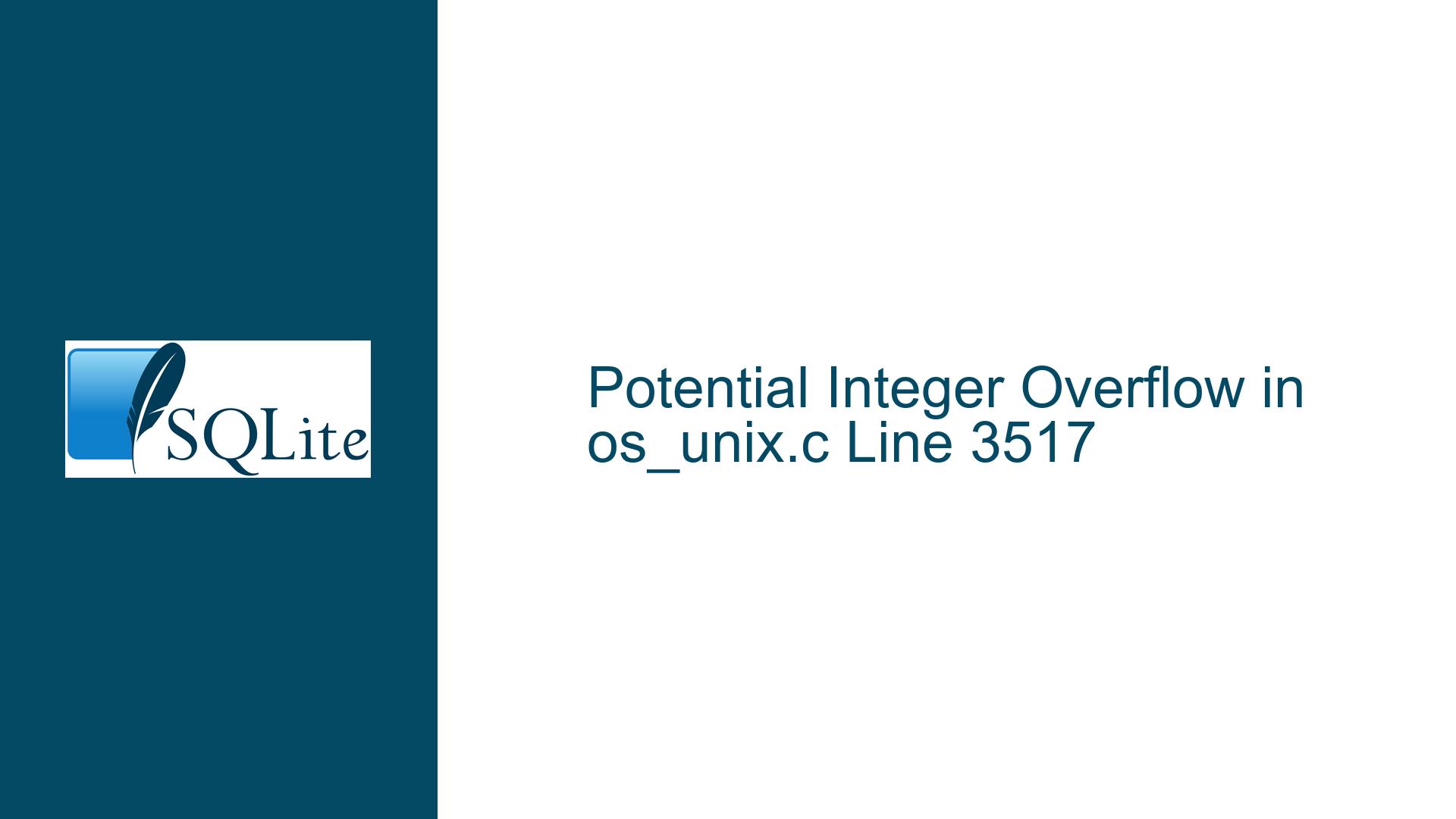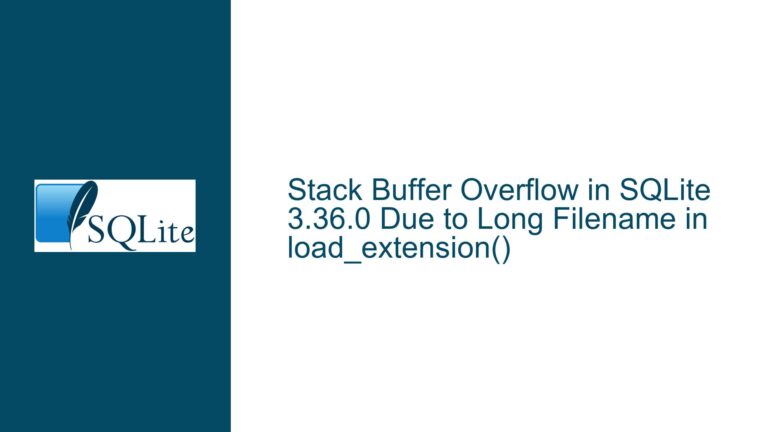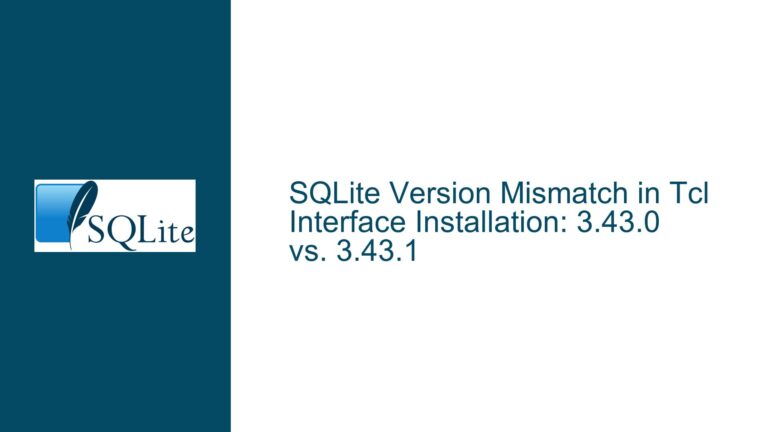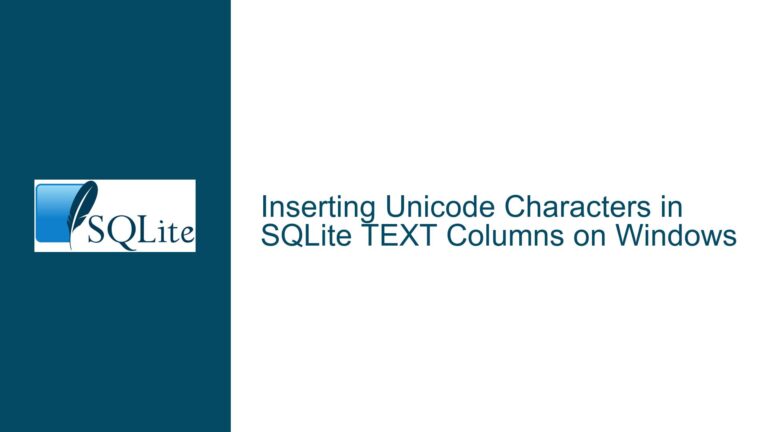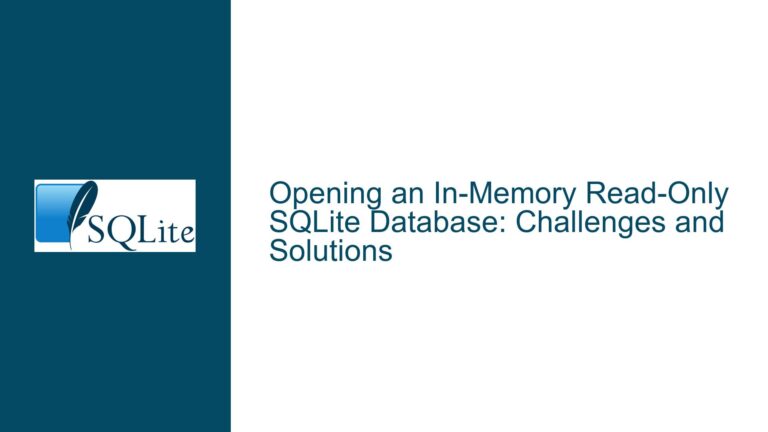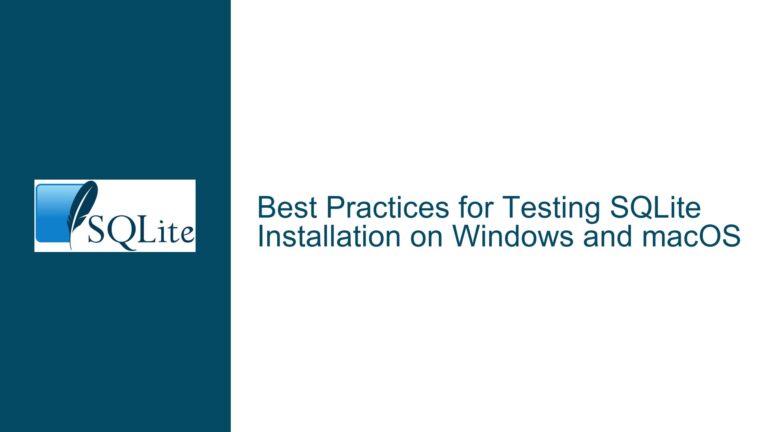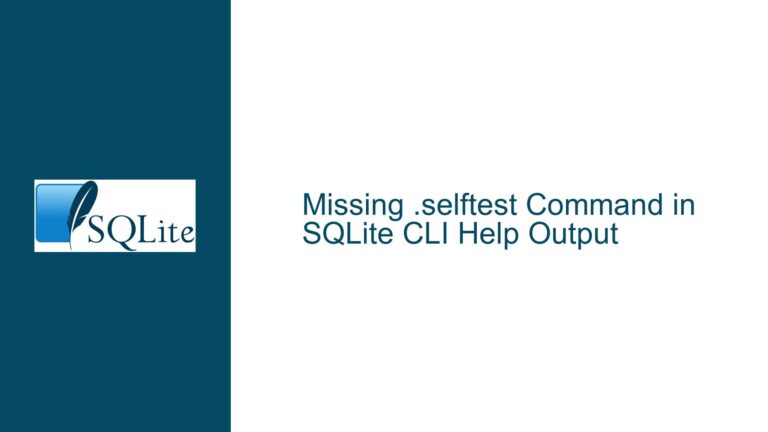Potential Integer Overflow in os_unix.c Line 3517
Issue Overview: Integer Overflow Risk in os_unix.c Line 3517
The core issue revolves around a potential integer overflow vulnerability in the SQLite source code, specifically in the os_unix.c file at line 3517. The line in question is:
int nCopy = pFile->mmapSize - offset;
Here, pFile->mmapSize and offset are both of type i64 (64-bit integers), while nCopy is declared as an int (typically a 32-bit integer on most systems). This discrepancy in data types creates a risk of integer overflow when the result of the subtraction exceeds the maximum value that can be stored in a 32-bit integer.
Integer overflow occurs when an arithmetic operation produces a result that is too large to be represented within the allocated storage space. In this case, if pFile->mmapSize - offset yields a value greater than INT_MAX (2,147,483,647 on a 32-bit system), the result will wrap around, leading to undefined behavior or incorrect values being assigned to nCopy. This can have severe consequences, including memory corruption, crashes, or security vulnerabilities, especially in a database system like SQLite where memory-mapped files are used for performance optimization.
The issue is particularly concerning because os_unix.c is part of the Unix-specific implementation of SQLite’s virtual file system (VFS). The VFS layer is responsible for handling file operations, including memory-mapped I/O, which is critical for performance in many SQLite use cases. A bug in this layer could affect a wide range of applications relying on SQLite for data storage.
Possible Causes: Data Type Mismatch and Arithmetic Overflow
The root cause of this issue lies in the mismatch between the data types used in the arithmetic operation. Let’s break down the components involved:
Data Type Mismatch:
pFile->mmapSizeandoffsetare both of typei64, which is a 64-bit signed integer. This means they can store values ranging from -9,223,372,036,854,775,808 to 9,223,372,036,854,775,807.nCopyis declared as anint, which is typically a 32-bit signed integer on most systems. This limits its range to -2,147,483,648 to 2,147,483,647.
When the result of
pFile->mmapSize - offsetexceeds the range of a 32-bit integer, the value assigned tonCopywill be truncated, leading to incorrect results.Arithmetic Overflow:
- The subtraction operation itself is safe when performed with 64-bit integers. However, the result of this operation is implicitly cast to a 32-bit integer when assigned to
nCopy. This implicit cast is where the overflow occurs. - For example, if
pFile->mmapSizeis 3,000,000,000 andoffsetis 1,000,000,000, the result of the subtraction is 2,000,000,000, which is within the range of a 32-bit integer. However, ifpFile->mmapSizeis 3,000,000,000 andoffsetis 500,000,000, the result is 2,500,000,000, which is still within range. But ifpFile->mmapSizeis 4,000,000,000 andoffsetis 1,000,000,000, the result is 3,000,000,000, which exceedsINT_MAXand causes an overflow.
- The subtraction operation itself is safe when performed with 64-bit integers. However, the result of this operation is implicitly cast to a 32-bit integer when assigned to
Context of Memory-Mapped Files:
- The variable
nCopyrepresents the number of bytes to copy from the memory-mapped file. IfnCopyis assigned an incorrect value due to overflow, it could lead to reading or writing beyond the intended memory boundaries. This could corrupt memory, crash the application, or expose sensitive data. - Memory-mapped files are often used to improve performance by allowing direct access to file data in memory. However, this also means that any bugs in this area can have significant performance and security implications.
- The variable
Platform-Specific Behavior:
- The behavior of integer overflow can vary across platforms and compilers. Some systems may wrap around silently, while others may trigger undefined behavior. This makes the issue particularly insidious, as it may not manifest consistently across different environments.
- Additionally, the size of
intcan vary depending on the platform. While it is typically 32 bits, some systems may use a different size, further complicating the issue.
Troubleshooting Steps, Solutions & Fixes: Addressing the Integer Overflow
To resolve the integer overflow issue in os_unix.c line 3517, we need to ensure that the result of the subtraction operation is correctly handled and does not exceed the range of the target data type. Below are detailed steps and solutions to address this problem:
Use Consistent Data Types:
The simplest and most effective solution is to ensure that all variables involved in the arithmetic operation use the same data type. SincepFile->mmapSizeandoffsetare bothi64,nCopyshould also be declared asi64. This eliminates the risk of overflow during the assignment.i64 nCopy = pFile->mmapSize - offset;This change ensures that the result of the subtraction is stored in a variable of the same size, preventing any truncation or overflow.
Add Range Checking:
If changing the data type ofnCopyis not feasible, we can add range checking to ensure that the result of the subtraction does not exceed the range of a 32-bit integer. This can be done using conditional statements:i64 result = pFile->mmapSize - offset; if (result > INT_MAX || result < INT_MIN) { // Handle the error, e.g., log an error message or throw an exception } else { int nCopy = (int)result; }This approach ensures that
nCopyis only assigned a value if it is within the valid range for a 32-bit integer. If the result is out of range, appropriate error handling can be implemented.Use Safe Arithmetic Libraries:
Another approach is to use safe arithmetic libraries or functions that handle integer overflow explicitly. For example, the__builtin_add_overflowand__builtin_sub_overflowfunctions provided by some compilers can be used to detect overflow during arithmetic operations:i64 result; if (__builtin_sub_overflow(pFile->mmapSize, offset, &result)) { // Handle the overflow } else { int nCopy = (int)result; }These functions return a boolean value indicating whether an overflow occurred, allowing for explicit handling of such cases.
Refactor the Code:
If the use ofnCopyas anintis deeply embedded in the codebase and changing its type would require extensive refactoring, consider refactoring the code to minimize the risk of overflow. For example, you could break down the operation into smaller steps or use alternative data structures that do not rely on 32-bit integers.Testing and Validation:
After implementing the fix, thorough testing is essential to ensure that the issue is resolved and no new bugs are introduced. This includes:- Unit tests to verify the behavior of the modified code under various edge cases.
- Integration tests to ensure that the fix does not affect other parts of the system.
- Stress tests to validate the performance and stability of the application under high load or large data sets.
Code Review and Auditing:
Finally, conduct a comprehensive code review to identify any similar issues in the codebase. Integer overflow vulnerabilities can often occur in other parts of the code, especially in low-level system programming. A thorough audit can help uncover and address these issues before they cause problems in production.
By following these steps, you can effectively address the integer overflow issue in os_unix.c line 3517 and ensure the robustness and reliability of your SQLite-based application.
